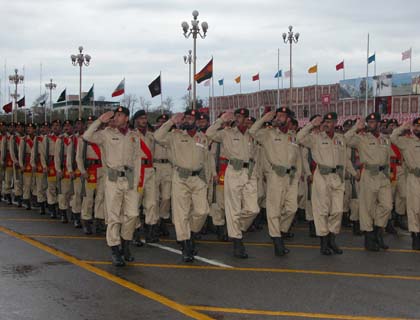Pakistan's history is full of criticism for army's intervention in politics but when Pakistan army and Pakistan People's Party reconciled to stop the military intervention in politics and to allow the politicians to come back to country to run the state since then the old companions of establishment united to sabotage this last hope of democracy to flourish in Pakistan.
This reconciliation was between Liberal Pakistan People's Party and an army which is experienced in war but also afraid of defamation of being supporter of terrorist organizations and at any time could be targeted by international community. Musharaf in the very beginning felt the need of parliament to neutralize international pressure and also made contacts with the exiled leader Benazir Bhutto but at that time they could not reach an agreement.
But the same agreement was possible between Benazir and Musharaf before the elections of 2008. When Pakistan was in the midst of terrorist attacks, political and judicial crisis, and even international investors were running out of Pakistan, Benazir Bhutto came to Pakistan and showed to the world that Pakistan is still a place worth living.
The first attack on this reconciliation was the event of martyrdom of Benazir Bhutto. A Sindhi leader was killed by a Pakhtoon on the soil of Punjab. This was an international plot to destabilize Pakistan and to provoke the political forces against Musharaf – the main player in bringing military and politicians close to each other. The second attack on the reconciliation was the overthrowing of Musharaf from the presidency. Army tolerated that insult but did not tear down the reconciliation pact.
The language of Kerry-Lugar Bill was also a challenge for Pakistani politics. The text of the bill had been released even before the formal bill passing procedure. This deliberate or accidental act of America created doubts that it could be an attempt to create misunderstandings among Pakistani government, political parties and the army.
The conditions set in that Bill were almost a reflection of the present memo. That's why now when the dust of memo is settling down some analysts have started to doubt to see American involvement in memo episode to create gap between politicians and army.
The Raymond Davis episode was another challenge for the sitting government and Pakistani establishment. It is said that Pakistani intelligence agencies wanted to teach a lesson to American CIA while government wanted to cool down the situation by creating some compensational loop holes in the law.
The person who sided with establishment that is Foreign Minister Shah Mehmood Qureshi had to suffer the wrath of the government. The establishment evened the score by compelling the government to take resignation from Hussian Haqqani the Pakistani ambassador to US.
The Usama's death in Abbotabad – a military stronghold – could create misunderstandings between government and military because of the expected International pressure and though Nawaz Sharif tried his best to kneel down military but government fully supported Pakistani establishment.
When this attempt ended in failure an American businessman Mansoor Ijaz propagated his notorious memo contents and became media beloved one. No one objected the credentials of Mansoor Ijaz and targeted President Zardari. This time the people who are opposed to reconciliation between army and People's Party were successful in the sense that memo has created some cracks in army-government relations.
But if we suppose that reconciliation is not brainchild of Benazir Bhutto and it was basically a need of Pakistan army then it is a fact that still this reconciliation is intact and even flourishing in the sense that army has not tried to overthrow the government.
It is evident that army and main political parties want that present government should complete its term. Recently Imran's announcement of next rally in Quetta on 23rd March shows that Military wants to give time to the government to conduct senate elections.
To avoid Libya like situation which is unambiguously funded by western powers, Pakistan army has created a new set of politicians under the banner of Pakistan Tehrik-e-Insaf. This party is now popular among the public and even if it will not secure majority in the next elections, this party will add to the credibility of elections and parliamentary system on one side and will also attract public towards elections rather than looking for some adventure like the one in Libya. Imran has tried to collect liberal and conservative elements in his party on one side and also snatched the uniqueness from Pakistan People's party to be a patron of artists and singers.
Though Imran has opted to bring the tested politicians to front however it may be a coincidence but some of the politicians who joined PTI, are the one who were also once the beloved of media. Shah mehmood Qureshi is remembered as a tough guy who wanted to side with establishment on the issue of Raymond Davis, Javed Hashmi is remembered for his pure-heartedness, Azam Swati is famous for brining to court the corruption cases against the government.
The reconciliation which started from the elections of 2002, is now heading towards the elections of 2013. Army has well played its cards and still media feels bound to well come establishment supported politicians.

